Filed under: Community Organizing, Featured, Indigenous, Land, Political Prisoners, Repression, Southern Mexico
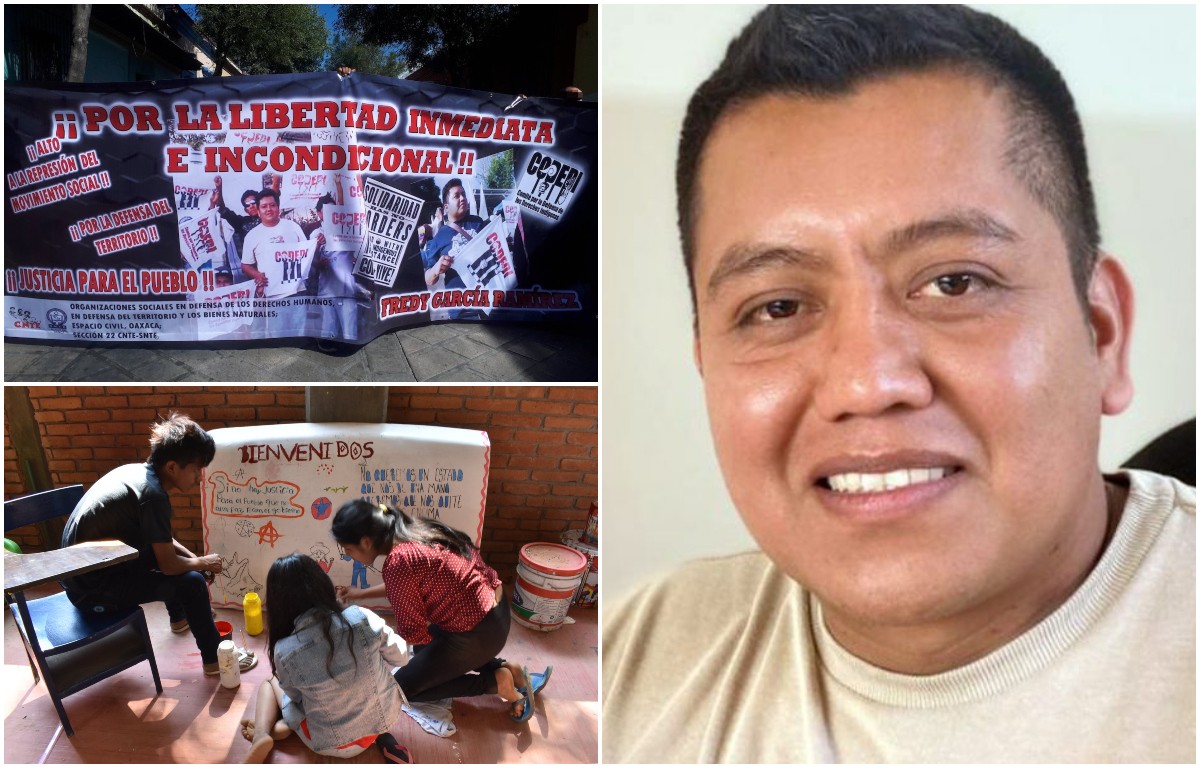
It’s Going Down recently had the chance to talk over the phone with Fredy García Ramírez, an Indigenous Zapotec community organizer and political prisoner, locked up in Tanivet, Oaxaca. During our conversation, we discussed Indigenous organizing in Oaxaca, the history and work of the Committee in Defense of Indigenous Rights (CODEDI), capitalist mega-projects, and state repression. We also talk about Fredy’s legal situation, the conditions inside the Tanivet prison, prison organizing, and prisoner solidarity. Below we publish the audio interview in Spanish, accompanied by the written transcription of the interview in both English and Spanish.
IGD: Good morning, compa. To get started, do you want to introduce yourself to those who are listening to this program?
Yes, my name is Fredy García Ramírez. I am a member of the organization Committee in Defense of Indigenous Rights CODEDI, imprisoned in the Men’s CERESO in Tanivet, Oaxaca.
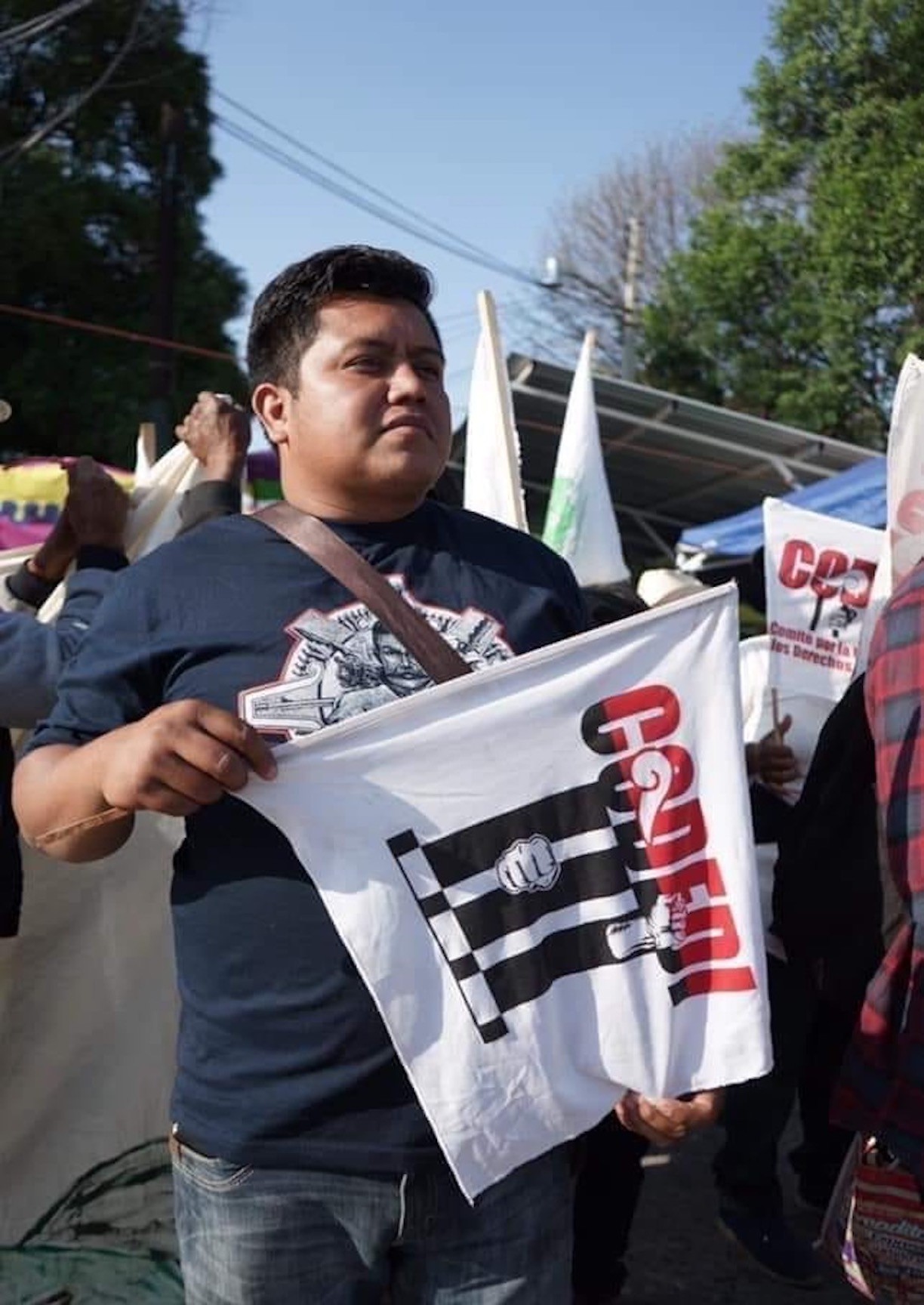
IGD: Could you talk with us a little bit about the history of the Committee in Defense of Indigenous Rights (CODEDI), the organization to which you belong. Where and how did the organization come about? In how many communities are you all working? How do the communities organize between themselves? What objectives does the organization have for the participating communities?
The organization CODEDI was born in 1998 in the municipality of Santiago Xanica in the Sierra Sur of Oaxaca. At that time, I was not part of the organization. The organization came about in order to defend the usos y costumbres (customs and traditions) of the community. As you all know, there have been many post-electoral conflicts in Santiago Xanica, and the state government has always sought to impose certain authorities in the municipality because of the many interests involved. As such, the organization was born to defend the usos y costumbres (customs and traditions) of the community. Since then, it has worked to defend the rights of Indigenous peoples, and has struggled for territorial defense. In this way, the organization was born locally. Since then, it has expanded to other neighboring communities who face similar problems, and who like the work that we do. These communities have called on the organization for support, and in this way, the organization has expanded to other communities. Currently there are around 45 communities in seven municipalities of Oaxaca. In the Sierra Sur, Coast, Central Valleys, and the Isthmus. Those are the four regions we have been working in.
One activity that has always motivated our work is food sovereignty. It is one of the principal projects we carry out, so that our compañeros can produce the products that they consume. It is something that our ancestors already did, but unfortunately the system has converted us into consumers. On one hand, because there is no government support in helping the communities plant their own territories. On the other hand, those who do, do so in an uncontrolled manner, using chemical fertilizers and pesticides. As an organization, we have always instilled in our compañeros, including educating the youth (further along I will talk about the Centro de Capacitación) that we must produce in a healthy way, using compost, manures, organic fertilizers. Planting organic seeds. Combating pests without chemicals. In many places, the government has sought to introduce genetically modified products, something we have always been against. Thus, we have worked with our compañeros, teaching them about the consequences of consuming chemical products ourselves, along with the consequences for nature, for our mother earth.
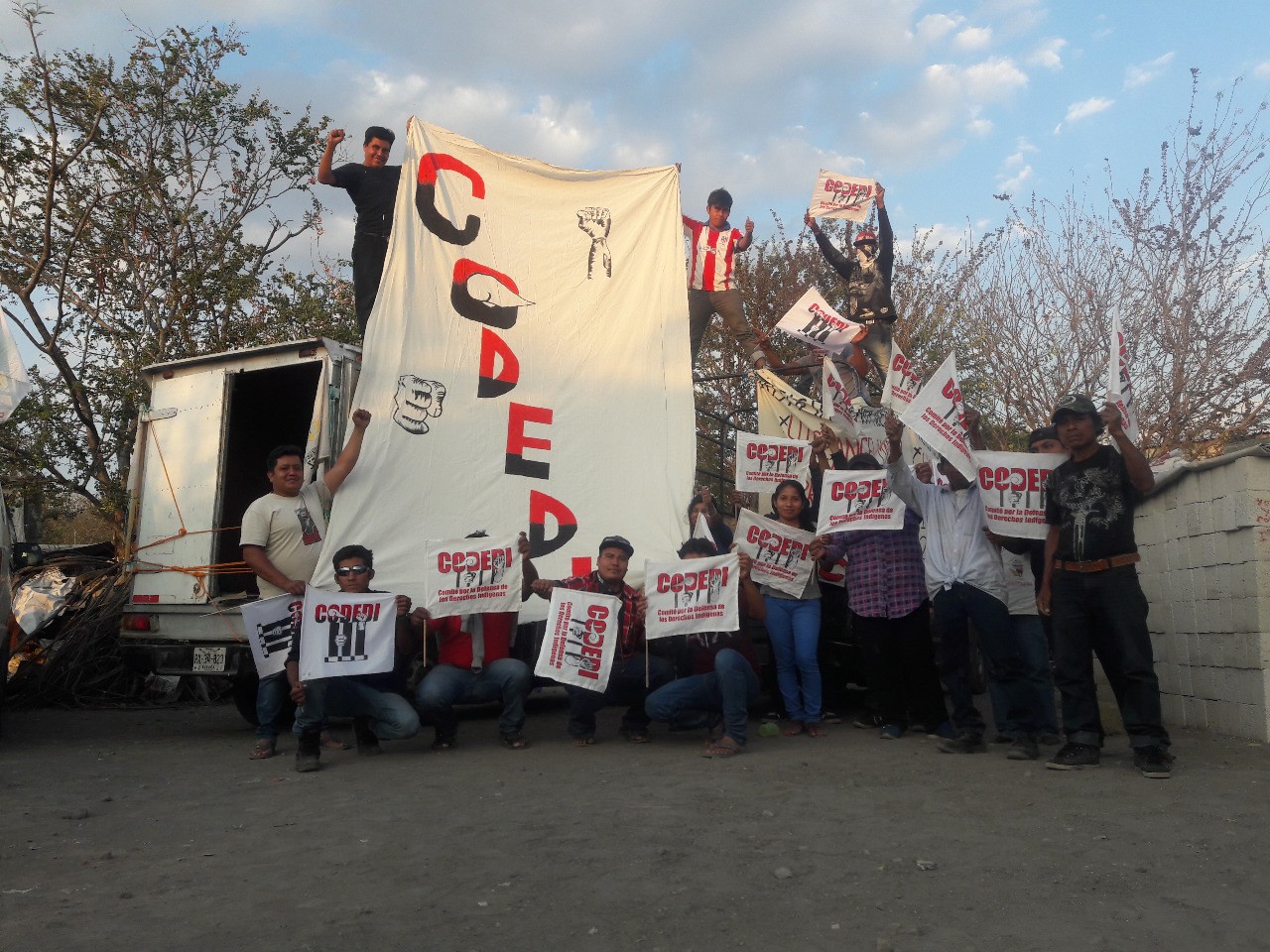
IGD: Could you talk to us about the Centro de Capacitación Ex-Finca Alemania. How did the project begin in the Sierra Sur? What relation does the ex-finca have with the communities that participate in the organization CODEDI?
This project was born many years ago, when the compañero Abraham Ramírez Vázquez was released from prison. He was unjustly imprisoned for six years. Once he left prison, he invited other communities to get organized. That is when I started participating. He was always talking about having a space to educate the communities, having a space to carry out activities and workshops. One of the principal objectives was to have a University of the Sierra Sur, as we call it, to give the youth an opportunity to continue studying. In reality, in our communities there are many young people who are interested in continuing to study, to educate themselves, but there is no opportunity for them to do so. Oftentimes their parents have few resources, or there isn’t a school nearby. In this way, we thought of the idea to have a space to give the youth that opportunity.
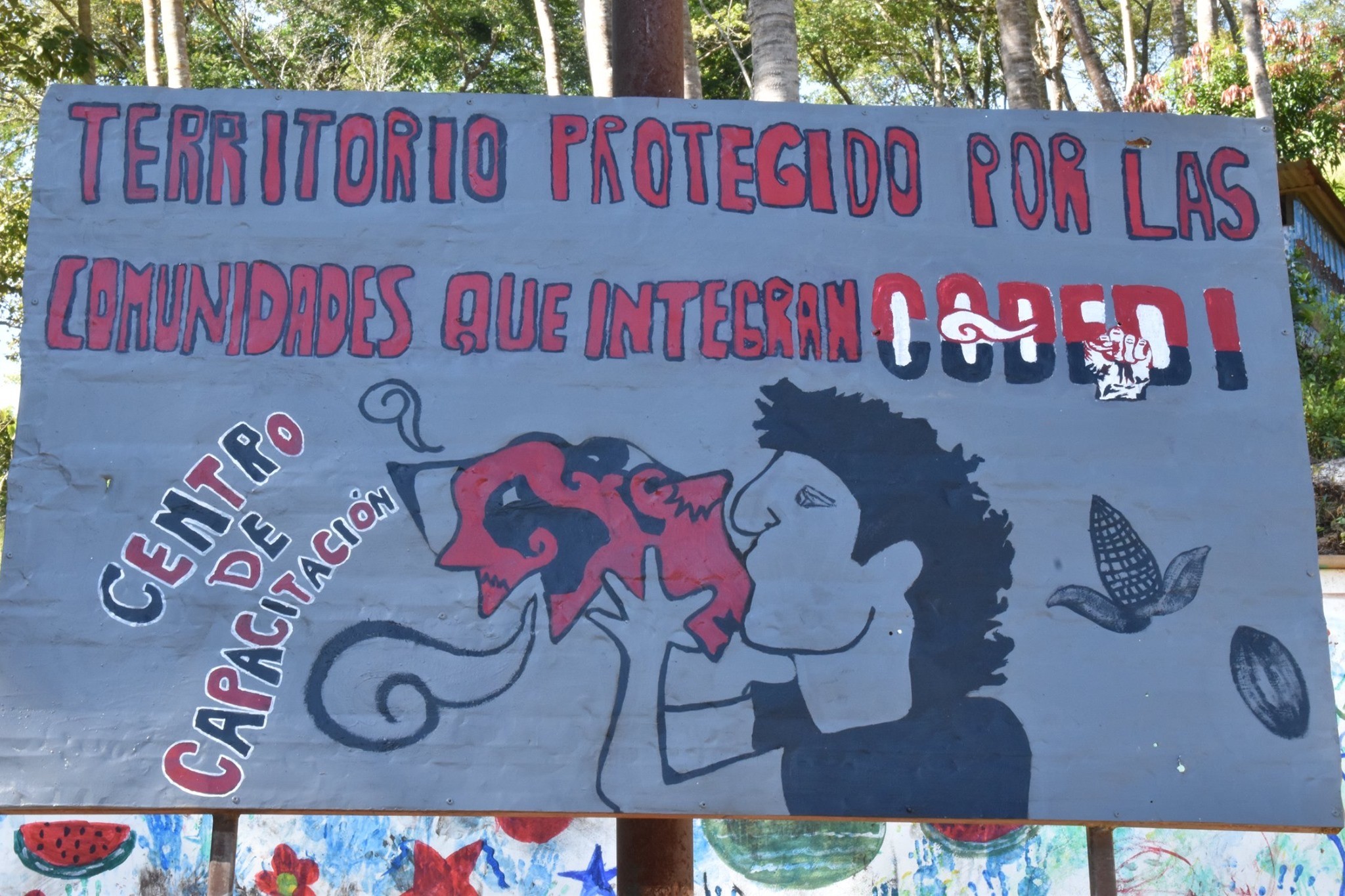
On April 19, 2013, the recuperation of the territory previously called the Finca Alemania began. It was recuperated with the support of all of the communities which in that moment belonged to the organization CODEDI.
It was 2015 when we began the organize the Centro de Capacitación with the support of all of the compañeros. We began to create workshops and classes for the youth. The university level was the principal objective, but we began with four education levels: kindergarten, elementary, middle school, and high school.
We started carpentry, metal, bakery, silkscreen printing, sewing, and traditional medicine workshops.

We did this with the support of all of the compañeros. We also invited all the young people so that they can educate themselves. It was totally free. We supported them with food, lodging, medical attention, school supplies. It did not cost them anything. That was our main objective.
We were carrying out productive projects. That was the idea, to create productive projects, that we could then share with the communities of the organization.
The state has always had productive projects, but there are always many rules involved. There are many people who have a project in mind, but when it comes time to apply for the project, they face many obstacles. They have to constantly submit the requested documentation and in reality, they spend more than the projects offer them. Thus, we began our own projects in the Centro de Capacitación CODEDI, as we now call it.
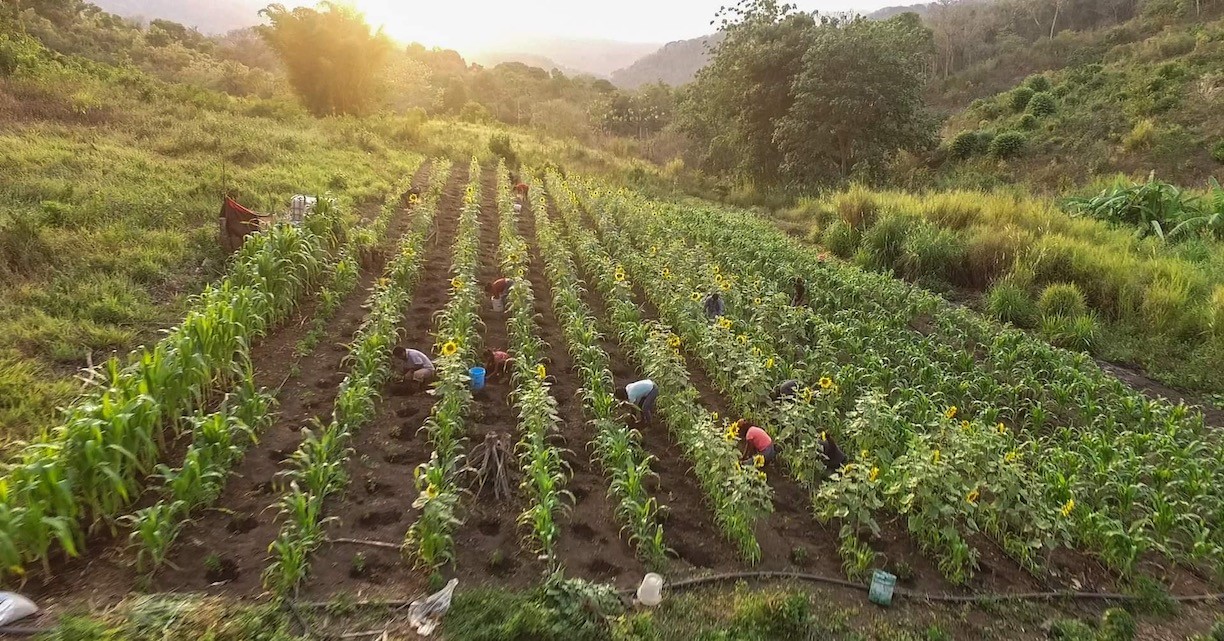
We started raising pigs, chickens, and cattle. We’ve already delivered various numbers of these animals to the communities. In this way, we have been expanding the different productive projects of the Centro de Capacitación.
All of the work has been done as a result of the communities. Since the beginning, the communities have always rotated, taking turns to work and grow the Centro de Capacitación.
Everything we do is carried out through assembly. All of the decisions that are taken in the organization have always been made through general assemblies in the communities where the organization has a presence. There is a structure: a president, a secretary, a treasurer, a spokesperson, which helps facilitate decisions. In the communities, we have an assembly every two months, and quarterly assemblies where all of the committees belonging to CODEDI participate, where future projects are proposed, and future work is analyzed. All of the decisions are made in assemblies, where all of the communities belonging to the organization CODEDI are present.
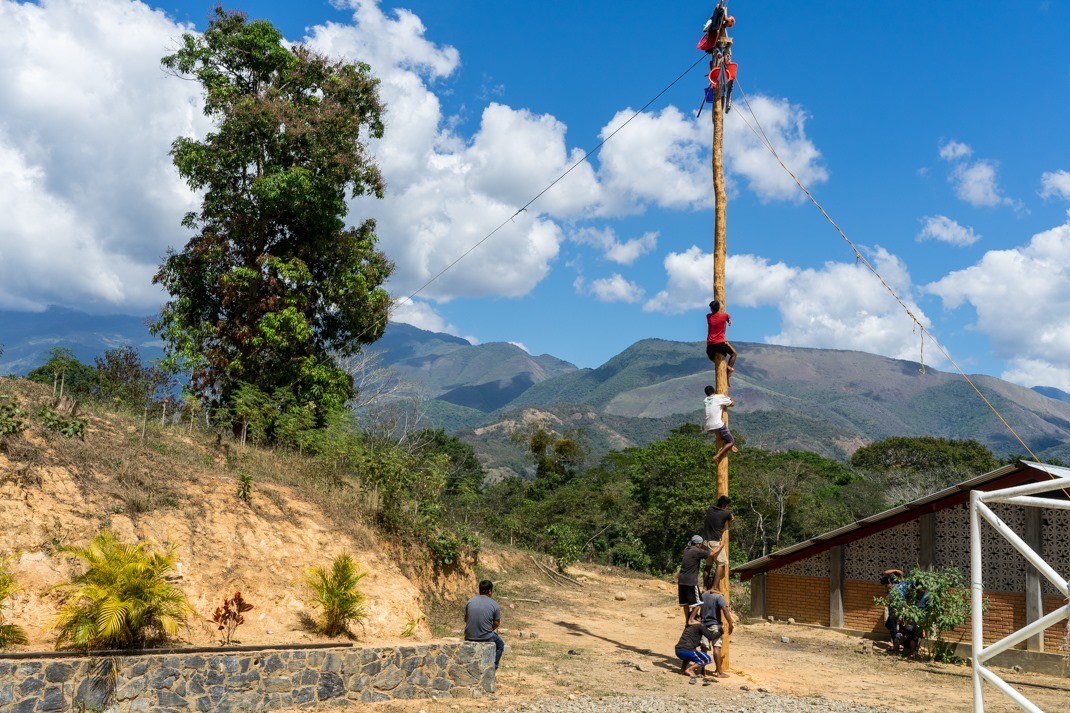
IGD: Could you tell us about the difficulties you all have faced as an organization in defense of Indigenous rights? What forms of repression and attacks have been carried out against you all?
Well, throughout the organization’s history, we have faced many difficulties due to the work we carry out. As we have said in various documentaries, we are like the pebble in the shoe of the state. We know that there are many cacique interests in our regions. We have always opposed mining concessions and the installation of hydroelectric projects, like the one being sought in the Copalita River, just ten minutes from the Centro de Capacitación CODEDI. For this, the government has always seen us as something negative, saying we are criminals, trying to portray us in certain ways.
Because of this, we have had compañeros imprisoned. In 2005, they detained our compañeros Abraham Ramírez Vazquez and Noel and Juventino García Cruz, who were unjustly imprisoned for six years. In 2019, they assassinated various compañeros in an attack whose objective was to eliminate Abraham Ramírez Vásquez. They didn’t succeed, but they did assassinate Alejandro Díaz, Ignacio Ventura, and Luis Ángel Martínez. These three were young people who were educating themselves at the Centro de Capacitación and decided to accompany Abraham Ramirez Vazquez to a meeting in Oaxaca City. Upon their return from the meeting with the state government, they were attacked in the Miahuatlán area. That same year, they assassinated Noel Castillo Aguilar in Barra de la Cruz, and Abraham Hernández, who was a local coordinator of the community of Salchi, in San Pedro Pochutla.
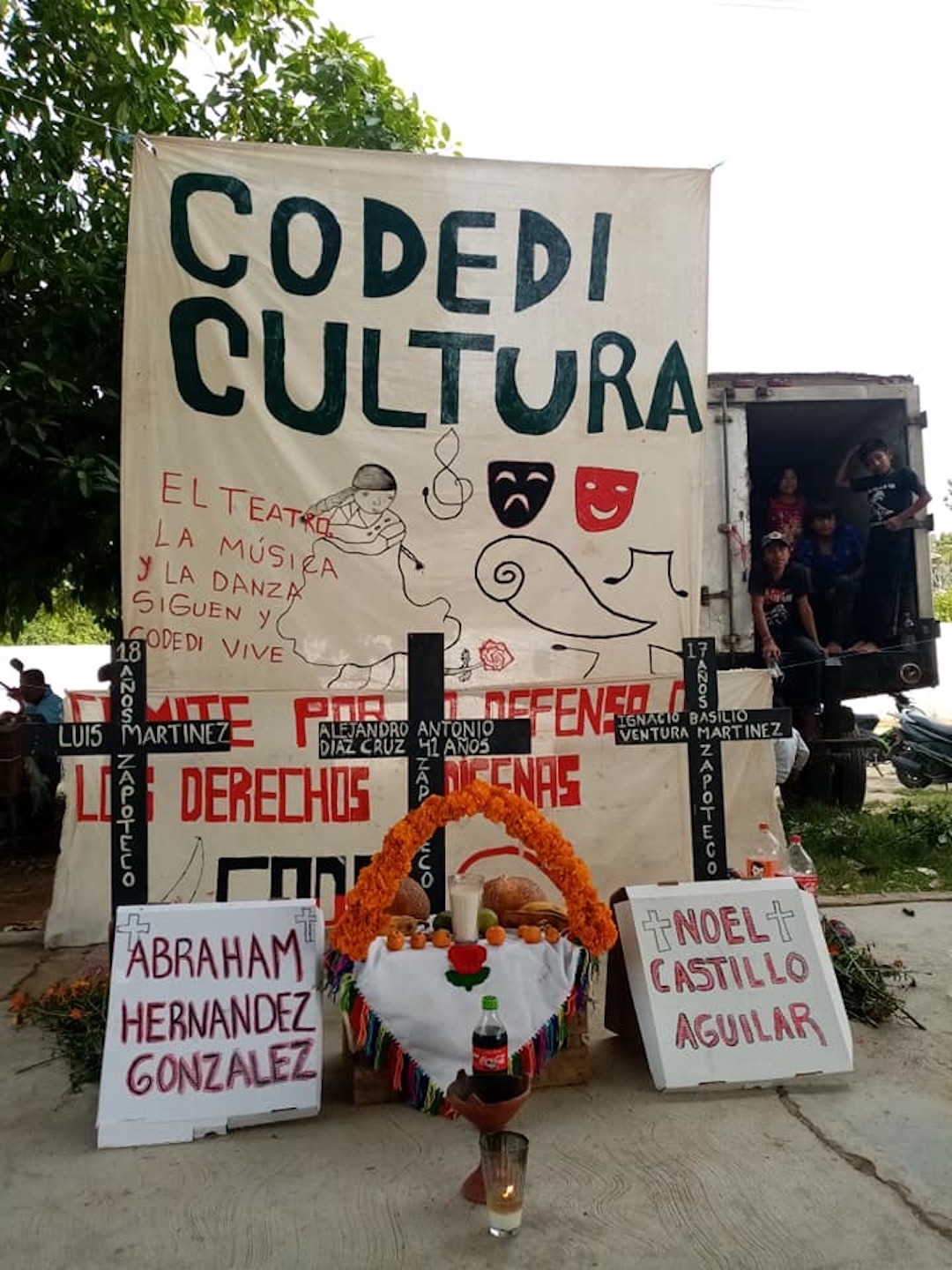
In these two places, Barra de la Cruz and Salchi, there have always been people who have sought to dispossess the communities of their beaches and territories, in order to install transnational projects, like a hotel zone. They asked for support from the organization and we began to denounce and resist the territorial dispossession. For that, they assassinated the two compañeros for defending their beaches, for defending their territories.
Also, throughout our history, there has always been extensive police repression, like harassment against compañeros and death threats. Personally, on various occasions, I have received death threats from unknown people. Another example is what recently took place in Santa María Huatulco, with the harassment and illegal detention of Cristóbal Ramírez. All of the time, we have faced these types of difficulties for the organizing work we have carried out as an organization.
The repression has been a direct result of the work we do and the way in which we organize ourselves and defend our territories. The state has always wanted to terrorize the compañeros, instill fear, plant terror, so that we don’t organize, so that the people are afraid to take to the streets, to shout and protest.
The people have been frightened due to the attacks we experienced in 2018 with the assassination of the compañeros. Many compañeros were frightened, they no longer wanted to go to the Centro de Capacitación, out of fear of being attacked en route. They no longer wanted to take the streets and protest because they were afraid of being attacked in whatever political activity. In the past, we have also been attacked. In 2016, we suffered an attack on a caravan that we organized from Santa María Huatulco to Oaxaca City. There has been too much harassment. That is what the state wants with my arrest. In reality, it is just another attack on our project, on the organization.
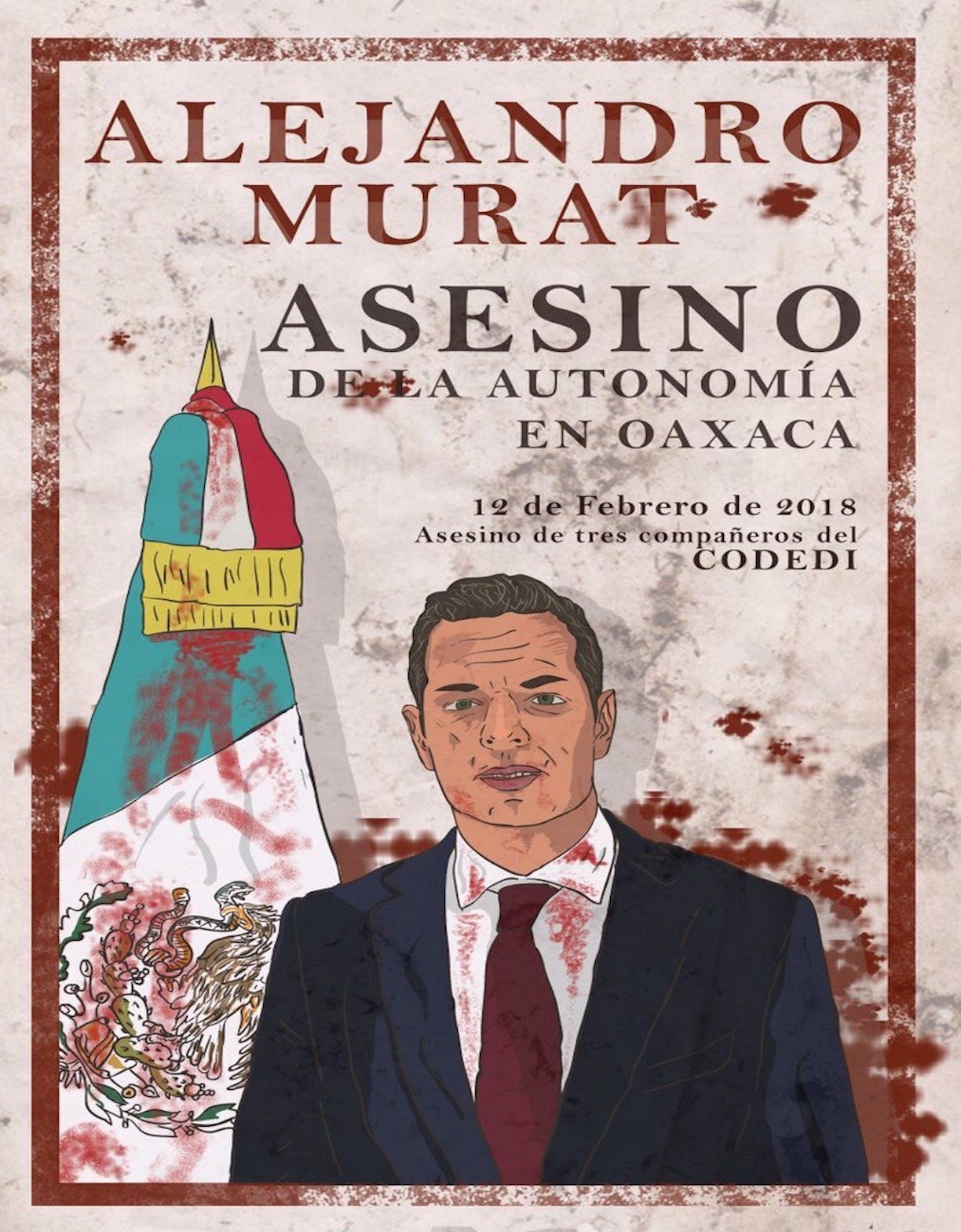
IGD: Moving along to your case as a specific example of repression against the organization, what events led to your arrest? What happened the day of your detention? What crimes are you being accused of?
On November 6, 2019, CODEDI, together with other organizations from Oaxaca, we decided to carry out a protest at the airport in Oaxaca City. The idea was to denounce the lack of responsibility and lack of compliance with the agreements we had reached with the Prosecutor’s Office regarding issues of justice. On one hand, for the compañeros of our organization who have been assassinated, while the crimes remain in impunity with no justice. On the other hand, the other organizations who are in the same situation, with imprisoned compañeros, assassinated compañeros, cases which have not advanced in the judicial process either. The cases remain in impunity. Thus, we went to carry out different activities here in Oaxaca City. To denounce the Prosecutor’s Office which in that moment was not complying with its duty. Rubén Vasconcelos was the head of the Prosecutor’s Office.
Leaving that activity, we held a press conference where we publicly denounced the situation. Afterwards, I was detained by armed men, dressed in civilian clothing. I was arrested and isolated. They arrested me on November 6 at six in the evening and I was brought to the Prosecutor’s Office on November 7, at like five in the morning. I was disappeared for various hours. There was a lot of concern on the part of the compañeros because they didn’t know where I was. They asked at the different branches of the Prosecutor’s Office, without an answer. There was a lot of concern on their part. So, I was arrested, they took me to my first hearing, and officially charged me. I was charged with assault, robbery, and injury.
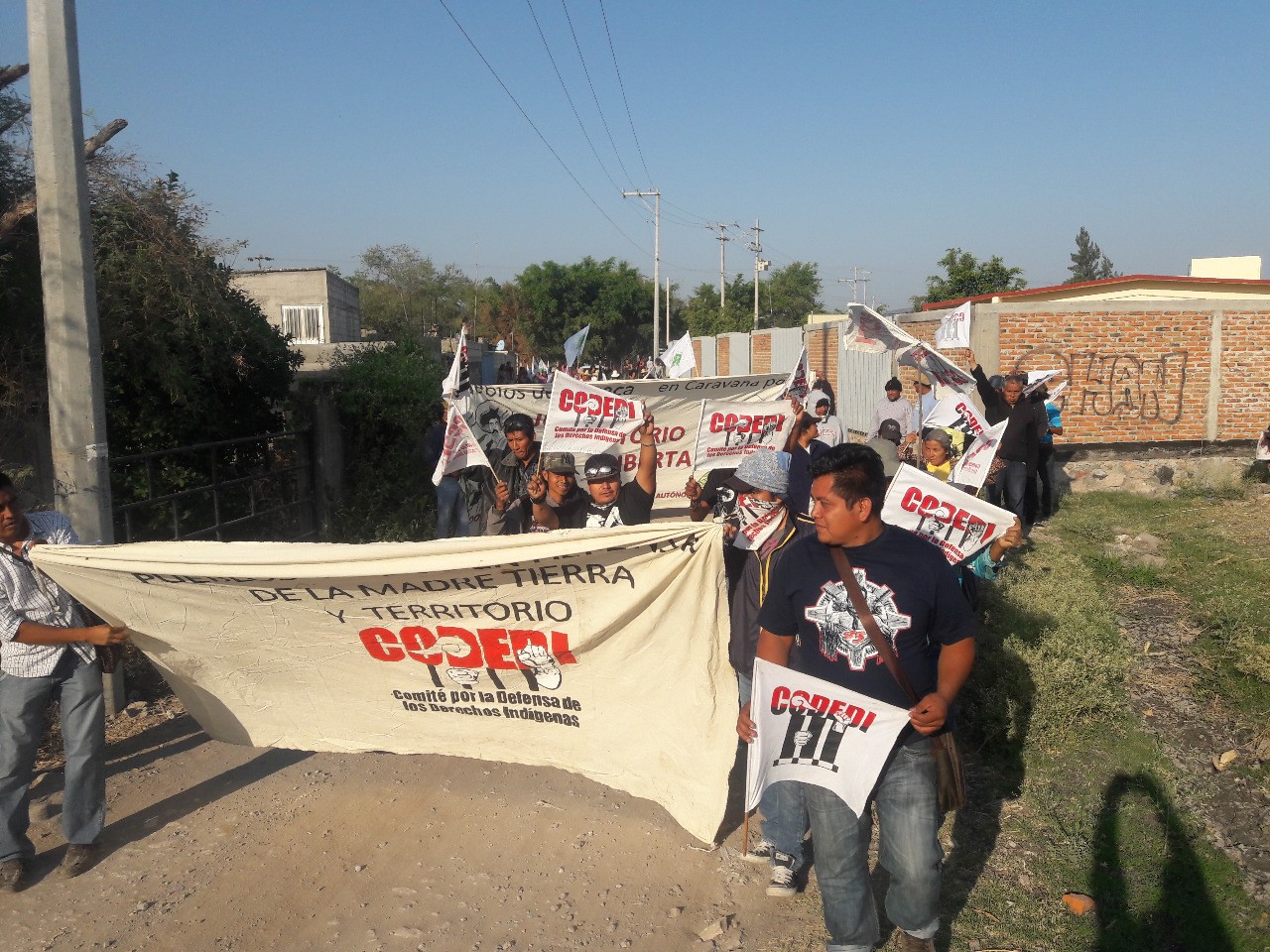
IGD: What is your current legal situation?
My current legal situation, well it has been delayed for far too long. My lawyer has always submitted everything on time and in the proper format, but with the pandemic, they have lengthened the process. In February, we went through the intermediate stage of the process. Now, more than six months have passed without them scheduling a hearing. The legal processes are at a complete standstill with the pandemic. It is always an excuse the courts use, that there is a pandemic and that they can’t transfer the prisoners to their hearings. There is an endless number of excuses. Thus, right now, we are waiting to schedule the oral hearing, as they call it, where they will define what my legal situation is going to be.
IGD: What is everyday life like inside the prison? What is the schedule? How are space and work organized? In what activities, classes, or workshops are you participating? What is the environment like in general inside the prison?
Well, inside the prison, it is always the same activities. They opened this prison in August 2019. It is thus just two years old. Structurally, the spaces are very small, very small and isolating. Between the modules, there is much isolation. It is really stressful to have such little space to live together. There is a small dining area, a sports area, a multipurpose court, but there is very little space. Daily, we have to do roll call, at 7am, another in the afternoon at 1pm, and another 6pm, when they lock us up in our cells. In the past, the activities were very few. But now, we have a schedule of activities. We can work from seven in the morning until nine at night. I normally do various activities to stay mentally healthy because it is very tiring. Sometimes you don’t work and you get bored. You want to think about things that stress you out and you get desperate. What I do is train my mind by weaving. I make bags out of plastic and with that, I occupy my time. In the evening, I read books to occupy my mind and time, in order to survive inside the prison.
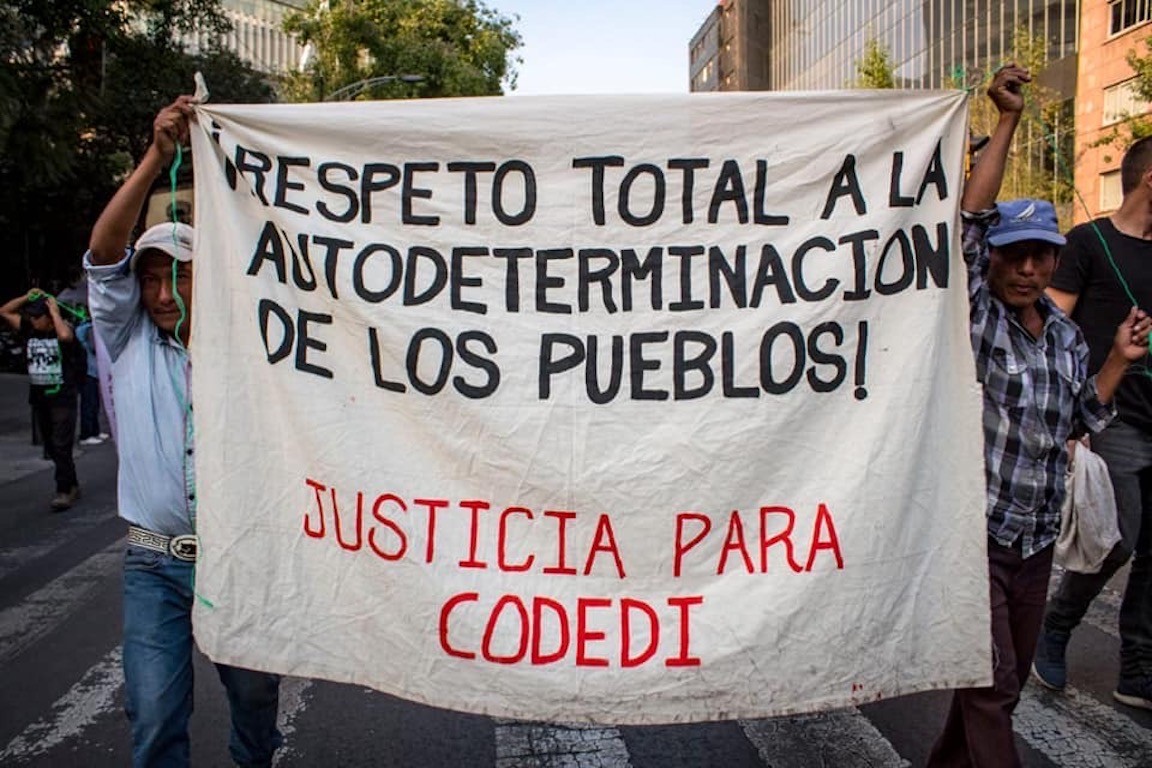
IGD: How has the COVID-19 pandemic affected life in prison?
The pandemic inside prison is very difficult. This prison was never prepared to face a pandemic of this magnitude. There have always been many deficiencies. Medical access is very limited. There are just three doctors for a very large population. Here, there are prisoners from the prisons they closed in Pochutla, Juchitán and Matías Romero. Now recently, they closed the prison in Ixcotel. All of those prisoners have been transferred here. Also, all new prisoners are being brought here to this prison. It is very overcrowded. When people are sick, or people have been infected by this COVID-19 pandemic, many people have died from lack of medical attention and medicine. It has been very difficult for us. Many times, when there is someone sick, they schedule an appointment with the doctor. Sometimes it takes five or six days to actually see the doctor. Many of these people are elderly, who need adequate medical attention. In reality, there are no security protocols in the face of the pandemic. It is very difficult to face this type of pandemic from inside prison.
The pandemic has also affected the temporalities of the judicial processes, lengthening them a lot. There have been months without having an answer, without having a hearing. There are compañeros who have gone a year without having a hearing. In my case, I’ve been in prison for two years and they still haven’t given me an oral hearing. Thus, regarding legal processes, things have been delayed a lot. They always blame the pandemic. In fact, they suspended the courts for six months. There were six months when they were totally closed. There are many prisoners who for months have not had the investigation stage of their legal processes closed. It has affected the judicial processes a lot. Many times, they already have hearings scheduled, but the prisoners aren’t taken to their hearings because of the pretext of the pandemic, because there are people infected, because they can’t be taken to their hearing for security reasons. Like that, they cancel the hearing, they schedule it again, we fall into red alert, and they cancel it again because the conditions aren’t there. This has extended the processes of each one of the compañeros for too much, too much time.
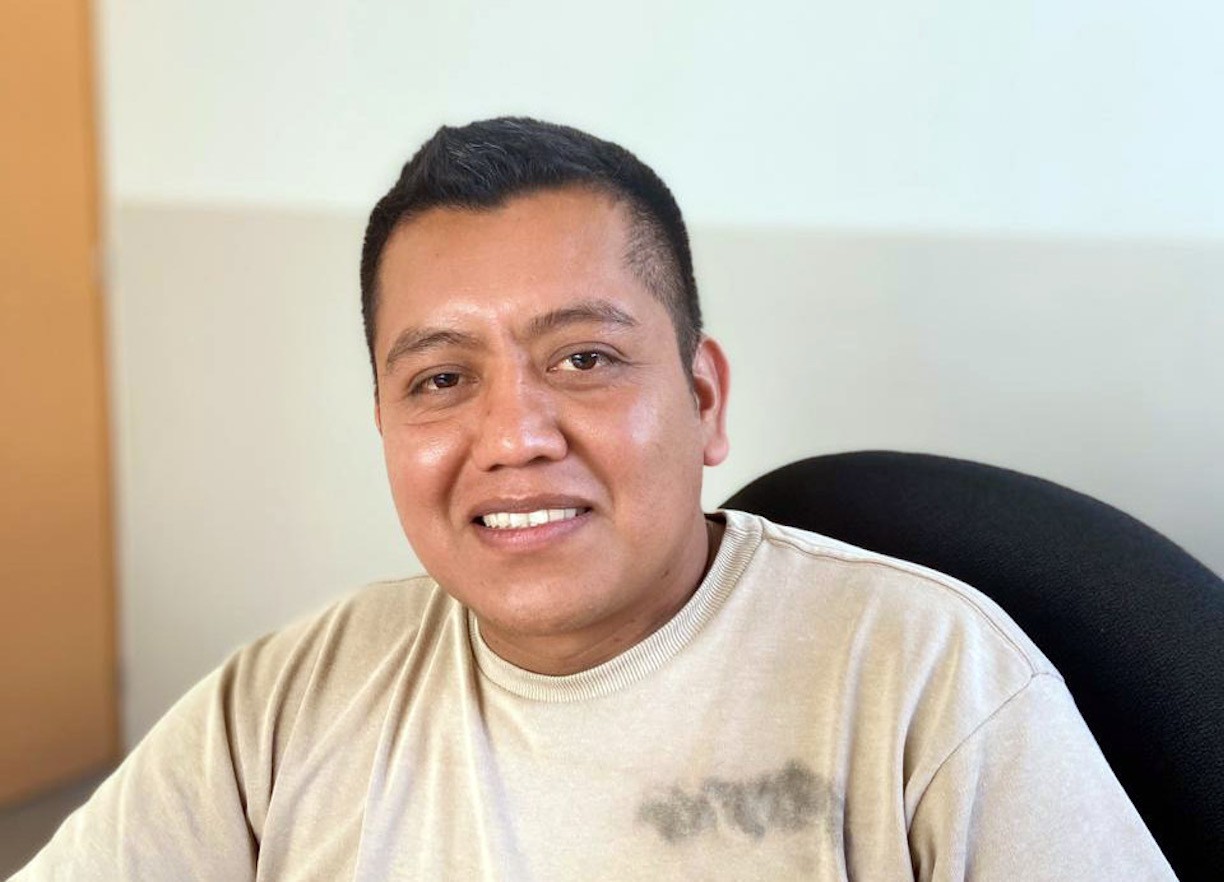
IGD: What organizational efforts have you participated in from inside prison? What does resistance look like inside prison?
It has been very bad. It is a prison where they want to subdue and control all of us, with very strict rules. However, due to the different activities that we have carried out inside the prison, many things have changed. However, they continue violating our rights. For example, here, they don’t care if they violate prisoners’ rights. Just because we are denied our freedom doesn’t mean that we can be denied our rights. We have all of our rights intact inside prison. This is a prison where they are constantly violating our rights. There are many people who have been tortured and beaten by the authorities of this prison. Nobody does anything. The state talks of wanting to apply justice, but inside prison they commit too many injustices against the prisoners. We have always denounced this. We have protested inside this prison so that they respect our rights. Bad or good, once we are in prison, we are complying with their law, but they do not comply with what really falls on them. Furthermore, the guards, they have never been trained properly.
Since arriving to this prison, and taking account of many bad things, including the violation of the rights of the prisoners, I began to organize hunger strikes with some compañeros to demand better conditions of life inside prison. I have been threatened on various occasions, including when I arrived here, I was tortured by the guards. I have been threatened many times, to get to me to stop what I was doing, to stop organizing the compañeros, to stop spreading the word about the conditions inside the prison.
On July 10, I was against beaten during a raid, when they brought federal and state forces into the prison. I was beaten and tortured. This has been very difficult for me and for the other compañeros.
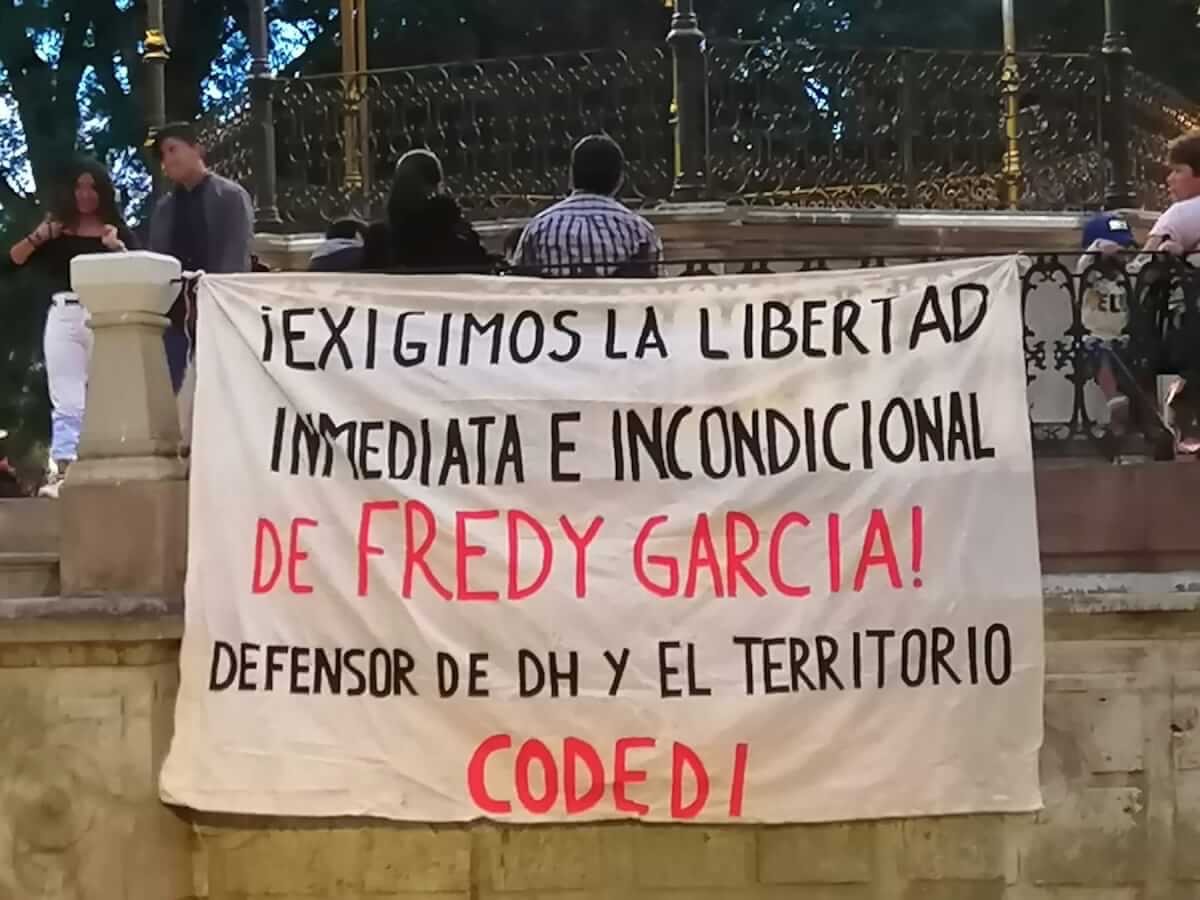
IGD: Anti-carceral struggles and prisoner solidarity are often marginalized within social struggles in Mexico. What relation do you see between anti-carceral struggles, prisoner solidarity, and other struggles for Indigenous autonomy, territorial defense, etc.?
Our enemy has always been the state, for the ways in which they have attacked us. For us, for me, it has always been our enemy. We have always struggled, both in the anti-carceral struggle and the struggle of Indigenous peoples, fighting for our rights as people. I think that is what links us. The goal is to unite, to organize ourselves and fight together, inside and outside the prison, to achieve our objectives, and to confront this capitalist monster.
IGD: What practical things can individuals, collectives, or organizations do to support the struggle for your freedom and the struggle of the organization CODEDI?
What you can do is spread the word about what is happening inside the prison, about the harassment, the attacks against our organization, so that people might support us. What we are asking is that we organize into a united front, that you all support us in applying pressure in order to speed things up so as to clarify the legal situation and truly achieve my freedom.

IGD: Lastly, any message, call out, or invitation that you want to make to the public who listen to independent media and community radio?
I want to recognize the work of the independent and community media. As an organization, we had a gathering of independent and community media in April 2018, when the community radio was founded that now exists inside the Centro de Capacitación CODEDI, called Radio Machete. It is the independent media which have always spoken the truth about what is happening in the communities, about the abuses the people have received from the capitalist government. It is the independent media who are not manipulated. I send them the message to continue working, to continue organizing, to continue spreading the reality of what is happening in each one of the corners of our communities. So that we organize ourselves and form a unified front.
IGD: Perfect. Thanks, compa.
Likewise, compa. Thanks for the space and the interview. We look forward to hearing from you all.

En Español:
It’s Going Down tuvo recientemente la oportunidad de hablar por teléfono con Fredy García Ramírez, defensor comunitario indígena zapoteco y preso político, encerrado en Tanivet, Oaxaca. Durante nuestra conversación, hablamos sobre la organización indígena en Oaxaca, la historia y el trabajo del Comité de Defensa de los Derechos Indígenas (CODEDI), los megaproyectos capitalistas y la represión del Estado. También hablamos de la situación juridica de Fredy, las condiciones dentro de la prisión de Tanivet, la resistencia anticarcelaria y la solidaridad con los presos.
IGD: ¿Qué tal compa? Buenos días. Para empezar ¿quieres presentarte con los compas y las compas que están escuchando este programa?
Pues sí, mi nombre es Fredy García Ramírez, soy integrante de la organización CODEDI y estoy privado de la libertad en el Cereso varonil de Tanivet.

IGD: ¿Podrías platicarnos un poco sobre la historia del Comité de Defensa de los Derechos Indígenas, CODEDI, la organización a la que la que perteneces? ¿Dónde y cómo surgió la organización? ¿En cuántas comunidades están trabajando y cómo se organizan entre ellas? ¿Qué objetivos tiene la organización para estos pueblos?
La organización CODEDI nació en 1998 en el municipio Santiago Xanica (Oaxaca). En ese entonces yo no formaba parte de la organización. Pero la organización nació para defender los usos y costumbres. Como ustedes saben, ha habido muchos conflictos post-electorales y el gobierno del estado siempre ha querido imponer autoridades en el municipio porque hay muchos intereses. De esa manera nació la organización, defendiendo los usos y costumbres de la comunidad y desde ahí se ha caracterizado por defender los derechos de los pueblos indígenas y promover la defensa del territorio. Nació como una organización local. Y también se ha ido expandiendo a otras comunidades circunvecinas a las que les ha gustado el trabajo, que también han tenido los mismos problemas y que han llamado a la organización a apoyarlos. Actualmente, hay presencia en alrededor de 45 comunidades en 7 municipios tanto en la Sierra Sur, en la Costa, en Valles Centrales, en el Istmo. Son esas 4 regiones las que se han venido trabajando.
Uno de los trabajos que siempre se ha impulsado es la soberanía alimentaria; es uno de los proyectos principales para que los compañeros empiecen a producir sus propios productos. Es algo que, anteriormente, nuestros antepasados hacían, pero desgraciadamente el sistema nos ha metido en una situación de ser consumistas. Mucha gente ha abandonado su tierra o han dejado de producir porque que no han tenido el apoyo del gobierno para cultivar sus territorios y muchos que cultivan lo hacen de una forma descontrolada, ocupando productos químicos para sembrar, para cultivar, para combatir las plagas. Nosotros, como organización, siempre hemos capacitado a los compañeros socios de la organización (incluso hemos capacitado a los jóvenes y más adelante voy a comentar sobre el Centro de Capacitación) para que produzcan de una forma sana, por medio de composta, abonos, fertilizantes, de manera orgánica para combatir las plagas sin químicos. También para sembrar semillas orgánicas. Porque en muchos lugares el gobierno siempre ha querido meter los productos transgénicos y todo el tiempo hemos estado en contra de eso, siempre capacitando a los compañeros, dándoles a saber las consecuencias que trae consumir productos químicos y también qué consecuencias traen a la naturaleza, nuestra Madre Tierra.

IGD: Muy bien, podrías platicarnos sobre el Centro de Capacitación ex finca Alemania, ¿cómo iniciaron el proyecto en la Sierra Sur? ¿Qué relación tiene la ex finca con las comunidades que participan en la organización CODEDI?
Este proyecto nació hace muchos años, desde que el compañero Abraham salió de la cárcel, estuvo preso 6 años injustamente. Una vez que sale de la cárcel nos invitó a otras comunidades, ahí fue cuando yo me integré. Desde que él llegó pues siempre platicaba de tener un espacio donde capacitar a las comunidades sobre lo que les platicaba anteriormente y tener un espacio donde hacer las prácticas, hacer talleres. Uno de los principales objetivos era tener una Universidad de la Sierra Sur, le llamamos, para darles una oportunidad a los jóvenes para que sigan estudiando, que se preparen, porque realmente en nuestras comunidades hay muchos jóvenes que tienen interés de seguir estudiando, tienen interés de prepararse, pero no hay la oportunidad para que ellos lo hagan porque muchas veces sus papás son de escasos recursos, o no hay una escuela cercana y pues de esa manera nosotros nos vimos la necesidad de tener un espacio donde poder darles la oportunidad a los jóvenes.

De esa manera fue que se recuperó un territorio que antes se llamaba Finca Alemania. Fue el 19 de abril de 2013 cuando se inició la recuperación de ese territorio. Y se recuperó con el apoyo de todas las comunidades que en ese momento pertenecían a la organización.
En el 2015 fue cuando se empezó a construir el Centro de Capacitación, con el apoyo de todos los compañeros. Se empezaron a crear los talleres y escuelas para que los jóvenes tuvieran. La Universidad era el objetivo principal, pero iniciamos con los cuatro niveles educativos que son preescolar, primaria, secundaria y bachillerato.
Se empezaron a construir talleres de carpintería, empezamos a abrir los talleres de balconería, de herrería, panadería, serigrafía, talleres de corte y confección, talleres de medicina tradicional.

Fue con el apoyo de todos los compañeros y pues también se fueron invitando a todos los jóvenes para que se pudieran capacitar. Todo totalmente gratuito, se les apoyó en cuestión de alimentación, de hospedaje, atención médica, de útiles escolares, no les costaba nada porque ese era nuestro objetivo principal.
Del Centro de Capacitación fuimos creando proyectos productivos, porque esa era la idea: crear proyectos productivos, que nosotros decimos para entregar a los socios de la organización.
Ya sabemos que en el estado siempre ha habido proyectos productivos, pero las reglas de operación son muchas. Entonces realmente muchas personas tienen un proyecto, pero a la hora de solicitar el proyecto les ponen muchas trabas. Tienen que ir constantemente a llevar la documentación que les solicitan y, realmente, es más lo que gastan que el proyecto que les entregan. A raíz de eso empezamos a crear nosotros mismos los proyectos productivos en el Centro de Capacitación CODEDI, así se le llama ahorita.

Empezamos con el proyecto de cerdos, de pollos, de ganado y pues ya se habían entregado varios lotes de estos diferentes proyectos a las comunidades. Hemos ido expandiendo los diferentes proyectos productivos dentro del Centro de Capacitación.
Antes que todo, el trabajo que se ha hecho pues es a raíz de las comunidades, desde el inicio siempre las comunidades se han turnado para ir trabajando para ir expandiendo, creciendo el Centro de Capacitación.
Todo ha sido realizado conforme a asamblea, todas las decisiones que se toman dentro de la organización siempre han sido mediante una asamblea general. En cada comunidad donde la organización tiene presencia hay una estructura que siempre toma los acuerdos, un presidente, un secretario, un tesorero, un vocal. Y en esos comités tenemos una asamblea bimestral que hacemos cada dos meses en una diferente comunidad, y asambleas trimestrales donde llegan todos los comités de todas las comunidades de CODEDI, donde se plantean los proyectos a seguir se analizan los trabajos que siguen dentro de la organización. Todas las decisiones se toman en las asambleas, donde están presentes todos los comités de las diferentes comunidades que pertenecen a la organización CODEDI.

IGD: ¿Podrías relatarnos las dificultades que han tenido que enfrentar como organización en defensa de los derechos indígenas? ¿Qué formas de represión y agresión se han utilizado en su contra?
Durante todo el caminar de la organización se han enfrentado muchas dificultades por el trabajo que desempeñamos. Como hemos dicho en varios documentales, somos como la piedra en el zapato del Estado, porque sabemos que hay muchos intereses caciquiles en nuestras regiones. Nosotros siempre nos hemos opuesto a las concesiones mineras, a que instalen proyectos hidroeléctricos como lo quieren hacer en el río Copalita que está a 10 minutos del Centro de Capacitación CODEDI. Y esa es una de las causas por las cuales el gobierno siempre nos ha visto como malos, nos han dicho que somos delincuentes, nos tratan de dibujar de otras maneras.
A raíz de eso hemos tenido compañeros encarcelados. En el 2005 encarcelan a nuestros compañeros Abraham Ramírez Vázquez, Noel y Juventino García Cruz que estuvieron 6 años presos injustamente.

Y también en 2018 nos asesinan a compañeros. En un ataque igual, pues el objetivo era eliminar al compañero Abraham Ramírez Vásquez. Nunca lo consiguieron, pero sí asesinaron al compañero Alejandro Díaz, al compañero Ignacio Ventura, al compañero Luis Ángel Martínez, que eran jóvenes que se capacitaban en el Centro de Capacitación y ese día pues decidieron acompañar al compañero Abraham Ramírez Vázquez a una reunión con el gobierno del estado. Al regreso los atacan por el paraje Miahuatlán. Ese mismo año asesinan a nuestro compañero, Noel Castillo Aguilar en Barra de la Cruz y a nuestro compañero Abraham Hernández, que era un coordinador local de la comunidad de Salchi de San Pedro Pochutla.
En esos dos lugares, Barra de la Cruz y Sachi, siempre ha habido un grupo de personas que han estado desalojando las playas, despojando a los compañeros de sus territorios desalojando el territorio de compañeros para instalar proyectos transnacionales, una zona hotelera. Nos pidieron el apoyo a la organización y empezamos a denunciar y a evitar que despojaran a los compañeros, por eso asesinan a estos dos compañeros que defendían las playas y los territorios.
A lo largo de nuestra lucha siempre ha habido mucha represión policiaca, como el hostigamiento hacia compañeros, amenazas de muerte; personalmente en varias ocasiones recibí amenazas de muerte por personas desconocidas. Como lo que pasó recientemente en Santa María Huatulco con una denuncia que se hizo hace un par de semanas cuando hubo hostigamiento y la detención ilegal del compañero Cristóbal Ramírez. Todo el tiempo nos hemos enfrentado a este tipo de dificultades por el trabajo que hemos realizado como organización, por el trabajo que desempeñamos, por la forma como nos organizamos y por cómo defendemos nuestro territorio. El Estado siempre ha querido aterrorizar a los compañeros, meter el miedo, sembrar el terror para que ya no nos organicemos, para que la gente tenga miedo de salir a las calles y gritar y manifestarse.
Y muchas veces la gente pues sí se espanta por los ataques que vivimos en el 2018 con el asesinato de los compañeros. Muchos compañeros se asustaron, ya no querían acudir al Centro de Capacitación, por ese temor de que los podían atacar en el camino ya no querían salir a manifestarse, por el temor de ser atacados en cualquier actividad política que hacemos. Porque también anteriormente nos han atacado. En el 2016 sufrimos un ataque en una caravana que realizamos de Santa María Huatulco a la ciudad de Oaxaca y pues ha habido demasiados hostigamientos. Eso es lo que quiere el Estado con mi detención, pues es un ataque más al proyecto, a la organización.

IGD: ¿Pasando ahora a tu caso como un ejemplo específico de la represión en contra la organizacin, que acontecimientos llevaron a tu detención, que ocurrió el día de tu detención y de que delitos te están acusando?
El día 6 de noviembre CODEDI, en conjunto con otras organizaciones de aquí de Oaxaca, decidimos realizar una actividad, una manifestación en el aeropuerto aquí de la ciudad de Oaxaca, para denunciar la inter responsabilidad y falta de cumplimiento de acuerdos que teníamos con la Fiscalía en temas de justicia. Uno, por los compañeros de nuestra organización que han sido asesinados en impunidad, no ha habido justicia en estos casos. Y las demás organizaciones que han estado en lo mismo, tienen compañeros presos, tienen compañeros asesinados, y tampoco avanzan en el tema de justicia. Siguen impunes todos los casos, por eso fuimos para realizar diferentes actividades en la ciudad de Oaxaca, para denunciar al fiscal que, en ese momento, pues estaba incumpliendo el titular de la Fiscalía, Rubén Vasconcelos. Realizamos una conferencia de prensa donde denunciamos públicamente y, saliendo de esa actividad, fui detenido por personas armadas, vestidos de civil.
Me detienen y me aíslan, me sacan de la ciudad y me desaparecen por varias horas hasta el siguiente día, el 7. Me detienen el día 6 de noviembre como a las 6 de la tarde y me presentan en la Fiscalía el día 7 de noviembre como a las 5 de la mañana. Había bastante, mucha preocupación de los compañeros porque no sabían de mí, preguntaban en los diferentes lugares de la Fiscalía y no había ni una razón de mí. Me detienen, me llevan a una audiencia, me vinculan a un proceso. Me acusan por el delito de asalto, por robo, y lesión.

IGD: ¿Y cómo está tu situación jurídica en este momento?
Mi situación jurídica actualmente va pasando por la situación de la pandemia y toda lo que está pasando actualmente en nuestro país y en el mundo con el Covid 19. Se ha retrasado demasiado. Mi defensa, mi abogado, siempre hemos entregado todo lo que corresponde al tiempo y forma pues, pero por la cuestión de la pandemia ya han alargado los procesos, pasamos a la etapa intermedia del proceso. Y ahorita llevo más de 6 meses sin ninguna respuesta de que me agenden a una audiencia. Este proceso está totalmente parado. Una, el pretexto que ponen los juzgados es que hay una pandemia, que no se puede trasladar a la gente, que hay un sinfín de pretextos. Así ahorita estamos en esa etapa de que nos agenden la audiencia de debate, o la audiencia de juicio oral, como le llaman. Donde ya se pretende definir cuál va a ser mi situación jurídica.
IGD: ¿Cómo es la vida cotidiana dentro de la cárcel? ¿Qué es el horario? ¿Cómo está la organización del espacio y trabajo? ¿En qué actividades, clases, o talleres estás participando? ¿Cómo está el ambiente en general adentro de la cárcel?
Bueno, pues dentro de la cárcel, siempre son casi las mismas actividades ¿no? Este es un penal que abrieron hace ha poco en agosto de 2019. El penal tiene pues casi pasaditos dos años desde que se abrió. Es un penal con una estructura de espacios muy pequeños ¿no?, muy pequeños y muy aislados, entre módulo y módulo hay mucho aislamiento. Realmente es muy estresante, por lo que tienes poco espacio para convivir. Hay un pequeño comedor. Un área deportiva, una cancha de usos múltiples, en la cual pues es muy poco el espacio. A diario hay que pasar tres listas, nos pasamos una lista a las 7 de la mañana, otra lista la pasamos a la una de la tarde, y otra a las 6 de la tarde, cuando nos encierran en nuestras celdas. Anteriormente eran muy reducidas las actividades. Pero ahorita pues ya tenemos un horario de actividades, ya podemos trabajar desde las 7 de la mañana hasta las 9 de la noche. Normalmente hago varias actividades para, de esa manera, pues, sobrevivir mentalmente sano de esta situación porque es muy desgastante. A veces no trabajas o te aburres. Quieres pensar cosas que a veces te estresan y te desesperas. Yo lo que hago pues es entretener mi mente en hacer artesanías, artesanías de hilo. Hago bolsas de plástico y en eso ocupo mi vida y también en la tarde me pongo a leer libros para ocupar el tiempo, tener ocupada mi mente. De esa manera sobrevivimos dentro de la prisión.

IGD: ¿Y cómo ha afectado la pandemia de Covid 19 a la vida en la prisión?
Bueno, la pandemia dentro la prisión es realmente difícil. Este penal nunca ha estado preparado para atender una pandemia de esta magnitud. Siempre ha habido muchas carencias en todos los sentidos. Realmente, la cuestión médica es muy reducida, apenas tienen tres médicos para una población muy grande: hay privados de la libertad del penal de Pochutla, del penal de que cerraron en Juchitán y Matías Romero, y recientemente cerraron el penal de Ixcotel; y a todos estos que son privados de su libertad junto con cada detenido que han sido vinculados a proceso, a todos los están trayendo a este penal. Está muy saturado, hay muchos enfermos o que han sido contagiados por esta pandemia de Covid 19, muchas personas han fallecido, por la atención médica, por la falta de medicamentos y ha sido muy difícil para nosotros. Cuando hay un enfermo se apunta al médico, pero lo están llevando hasta los 5 días, 6 días ¿no? Y muchos adultos mayores necesitan una atención adecuada que no hay. No hay protocolo de seguridad ante el Covid, no lo existe. Es muy complicado enfrentar ese tipo de pandemia dentro de esta prisión.
Esto nos ha afectado muchísimo en los procesos judiciales, porque realmente nos han alargado bastantísimo procesos, ‘tons ha habido meses sin tener una respuesta, sin tener una audiencia. Hay compañeros que llevan un año sin tener ni una audiencia. En mi caso, pues ya llevo casi 2 años y aún no me han dado la audiencia del debate. Suspendieron las audiencias 6 meses en los que estuvieron totalmente cerrados los juzgados. Hay muchos que llevan meses sin cerrar su etapa de investigación. Y realmente, pues sí nos ha afectado muchisísimo en los procesos judiciales, muchas veces ya se tienen las audiencias y no’más no los trasladan por el pretexto de la pandemia, de que hay contagiados, de que no se pueden trasladar por seguridad y pues que se cancelen las audiencias, las vuelven a agendar y de repente, pues caemos en semáforo rojo y que se cancela nuevamente porque no hay condiciones. Así nos traen a todos y realmente los procesos de cada uno de los compañeros se han alargado demasiado, se han alargado demasiado tiempo.

IGD: ¿En qué esfuerzos organizativos has participado en la cárcel? ¿Como es la resistencia dentro de la prisión?
Bueno, a raíz de los casos que hemos tenido creo que se nos estaba olvidando comentar hace un ratito, ha sido pésimo. Es una prisión donde nos quieren tener sometidos, controlados a todos, con reglas muy estrictas. Por ejemplo, ahorita, por las diferentes actividades que estamos haciendo adentro de este penal, muchas cosas cambiaron. Aún se siguen cometiendo violaciones de los derechos de los privados de la libertad, como lo dice el nombre, estamos privados de un derecho. Constantemente violan cada uno de nuestros derechos, hay muchas personas que han sido torturadas, golpeadas por las autoridades de este penal. Pues nadie hace nada ¿no? El Estado habla de que quiere aplicar una justicia, pero dentro de la prisión se cometen demasiadas injusticias hacia los privados de la libertad. Nosotros lo hemos denunciado, hemos protestado dentro de este penal, para que siempre se nos respeten nuestros derechos. Nosotros bien o mal, una vez estando presos vamos esclareciendo nuestra situación jurídica, estamos cumpliendo con la ley, pero ellos no cumplen con lo que realmente les corresponde, ¿no? Y el personal de custodia son personas que nunca han sido capacitadas de cómo tener la custodia de los privados de la libertad.
Como Fredy Garcia, yo, desde que llegué a este penal me di cuenta de muchas cosas que han estado mal y que estaban violando mucho los derechos. Empecé a organizar con unos compañeros huelgas de hambre, para exigir una mejor condición de vida dentro del penal. A raíz de esto he sido amenazado varias veces, incluso, cuando yo llegué a este penal, fui torturado por custodios de la seguridad dentro de la prisión. En muchos momentos fui amenazado para que dejara de hacer lo que estaba haciendo, para que dejara de organizar a los compañeros, que dejara de estar divulgando el penal, que si no iba a ver yo. El 10 de julio fui nuevamente golpeado en un operativo, cuando trajeron fuerzas federales y fuerzas estatales entonces sí, totalmente golpeado, torturado por estas personas. Y el trato con otros compañeros ha sido muy muy difícil.

IGD: Las luchas anticarcelarias y la solidaridad con los presos y las presas son a menudo marginadas dentro de las luchas sociales en México. ¿Qué relación ves entre las luchas anticarcelarias, la solidaridad con los presos y las presas y las otras luchas por la autonomía indígena, la defensa del territorio, etcétera?
Nuestro enemigo siempre ha sido el Estado, por las formas como nos ataca. Para nosotros, para mí, siempre ha sido nuestro enemigo. Y siempre hemos luchado tanto en la lucha anticarcelaria como en la lucha de los pueblos indígenas, para que se respeten nuestros derechos como personas. Creo que eso es lo que lo que nos relaciona: unirnos, organizarnos y luchar juntos dentro y fuera de la cárcel. Para de esa manera lograr nuestros objetivos y enfrentar a este monstruo capitalista…
IGD: ¿Qué cosas prácticas podemos hacer los individuos, colectivos y organizaciones para solidarizarnos con la lucha por tu libertad y la lucha de la organización CODEDI?
Lo que se puede hacer es difundir, difundir lo que se vive dentro de la prisión, difundir todo el hostigamiento, los ataques contra nuestras organizaciones, que se difunda, para que mucha gente se nos apoye. Se pide que nos organicemos y formemos un solo frente. Y que nos apoyen a presionar para que de esa manera se puedan agilizar las cosas y podemos esclarecer la situación jurídica y realmente alcanzar la libertad.

IGD: Por último, ¿algún mensaje, convocatoria, o invitación que quieres enviar al público que escucha los medios libres y las radios comunitarias?
Quiero reconocer el trabajo de los medios libres y comunitarios. Nosotros como organización, tuvimos un encuentro de medios libres y comunitarias en abril de 2018, cuando se fundó una radio comunitaria que existe dentro de este Centro de Capacitación CODEDI que se llama Radio Machete. Realmente, son los medios libres los que no están manipulados, los que siempre hablan la verdad de lo que está pasando en los pueblos, todo el golpe que han recibido los pueblos por parte de estos gobiernos capitalistas. Les doy un mensaje de que sigan trabajando, que se sigan organizando y que sigan difundiendo la realidad de lo que está pasando en cada uno de los rincones de nuestros pueblos; que nos organicemos y que hagamos un solo frente, ¿no?
IGD: Perfecto, muchísimas gracias, compa.
Pues igualmente compañero. Muchas gracias por el espacio y por la entrevista y estamos pendientes.






